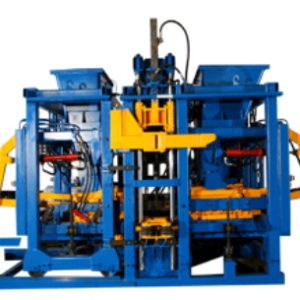Automation Features: Evaluate the automation features offered by the control system. Look for features such as automatic material feeding, precise material dosing, mixing control, block molding control, compaction control, demolding control, and conveyor system control. The control system should provide comprehensive automation capabilities to streamline the production process and optimize efficiency.
User Interface: Consider the user interface of the control system. It should be intuitive, easy to navigate, and user-friendly. A well-designed interface simplifies machine operation, allows for easy parameter adjustment, and provides clear feedback on the machine's status and performance.
Programmability and Flexibility: A control system with programmable logic controllers (PLCs) allows you to customize and adapt the machine's operation to meet specific production requirements. Look for a control system that offers flexibility in programming, enabling adjustments to block sizes, shapes, production sequences, and other parameters as needed.
Monitoring and Data Logging: The control system should provide real-time monitoring of critical parameters such as material flow, mixing ratios, compaction force, and production rates. It should also have data logging capabilities to record production data for analysis, troubleshooting, and quality control purposes.
Fault Diagnosis and Alarms: An effective control system should incorporate fault diagnosis capabilities and provide alarms or notifications in case of any abnormalities or malfunctions. This allows for prompt identification of issues and facilitates timely maintenance and troubleshooting.
Integration and Connectivity: Consider the compatibility and connectivity options of the control system. It should be able to integrate with other components of the block making machine, such as sensors, actuators, and auxiliary equipment. Additionally, connectivity features like Ethernet, USB, or wireless interfaces can enable remote monitoring, data exchange, and software updates.
Reliability and Support: Ensure that the control system is reliable and robust, capable of withstanding the demanding operating conditions of the block making machine. Choose a control system from a reputable manufacturer known for providing reliable products and excellent technical support.
Training and Documentation: Evaluate the availability of training resources and documentation provided with the control system. Proper training and comprehensive documentation will help operators understand the system's functionalities, operation, and troubleshooting procedures.
Future Expansion and Upgrades: Consider the potential for future expansion or upgrades of the block making machine. The control system should have the flexibility to accommodate additional features, accessories, or technological advancements that may be required in the future.
By considering these factors and discussing your specific requirements with control system manufacturers or suppliers, you can choose a control system that meets the needs of your fully automatic block making machine and ensures efficient and reliable operation.
Malfunctioning Sensors: Control systems rely on various sensors to monitor parameters such as material flow, compaction force, and position. Malfunctioning sensors can lead to inaccurate readings or erroneous control signals, affecting the overall performance of the machine. Regular sensor calibration, maintenance, and replacement when necessary can help mitigate this issue.
Communication Failures: Control systems often require communication between different components of the block making machine, such as sensors, actuators, and the control unit itself. Communication failures can result in errors or delays in signal transmission, leading to disrupted operation or reduced productivity. Adequate wiring, proper grounding, and regular inspection of communication interfaces can help minimize this challenge.
Programming and Configuration Errors: Control systems are typically programmable, allowing operators to customize machine parameters and sequences. However, programming or configuration errors can occur, leading to incorrect settings or unintended machine behavior. Thorough testing, verification, and adherence to programming guidelines can help prevent such issues.
Electrical or Power Supply Problems: Control systems rely on stable and uninterrupted power supply. blocks machine price Power fluctuations, electrical faults, or inadequate power conditioning can cause control system malfunctions, system resets, or even damage to components. Proper electrical installation, surge protection, and backup power solutions can mitigate these challenges.
Software Bugs or Incompatibility: Control systems often utilize software for programming, monitoring, and data logging. Software bugs or compatibility issues can impact system performance, cause crashes, or result in data loss. Regular software updates, quality assurance testing, and adherence to recommended software versions can help address these challenges.
Environmental Factors: Block making machines are often used in demanding environments, such as construction sites, where they can be exposed to dust, moisture, temperature variations, and vibrations. These environmental factors can affect the reliability and durability of control systems. Proper enclosure, sealing, and protection measures can help safeguard the control system from these conditions.
Operator Training and Familiarity: Control systems require competent operators who are familiar with their functionalities, operation, and troubleshooting procedures. Insufficient training or lack of operator experience can lead to errors, improper use, or difficulties in diagnosing and resolving issues. Comprehensive training programs and ongoing support can help address this challenge.
It's important to note that the specific issues or challenges can vary depending on the design, complexity, and quality of the control system. Regular maintenance, periodic inspections, and prompt troubleshooting can help mitigate these challenges and ensure the smooth operation of the control system in a block making machine.

Copyright:@2020-2021
Comments Please sign in or sign up to post.
0
0 of 500 characters used